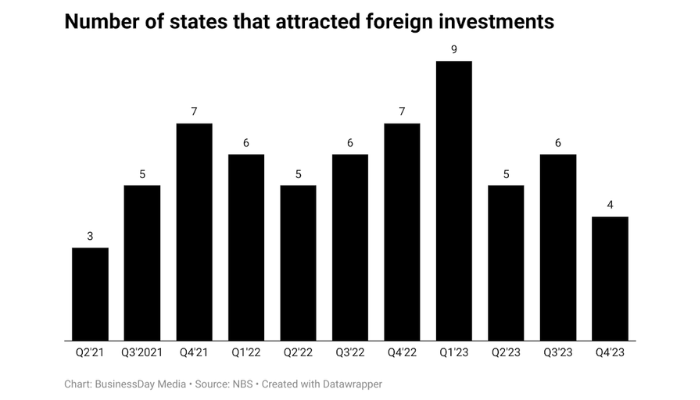…Number drops to lowest in nearly three years
The number of Nigerian states that attracted foreign investments in the fourth quarter of last year dropped to the lowest in almost three years, according to data compiled by BusinessDay.
The latest capital importation report published by the National Bureau of Statistics (NBS) showed that only four of the 36 states in the country got foreign capital in Q4, down from six in the previous quarter. The number rose to nine in Q1 before dropping to five in Q2.
Lagos, Abuja, Ekiti and Rivers attracted $1.09 billion in the last three months of the year, according to the NBS.
“The trend in the number of states getting investments has become very abysmal. It is just showing the perceived risk level of the market,” Damilare Asimiyu, macroeconomic strategist and head of investment research at Afrinvest West Africa Limited, said.
He said it is a cause for concern that the number has shrunk.
“Foreign investors are going for the states that are economically viable, where insecurity is less and the average citizen per capita income is still high.”
Okafor Tochukwu, a lecturer at Global Banking School, Stratford, London, said the rising inflation, foreign exchange crisis and insecurity has reduced foreign investments in states. “Even in Abuja, some investments have been reducing because of insecurity.”
A breakdown of the capital importation report showed that the total foreign investments in states in Q4 stood at $1.08 billion, 67.7 percent higher than $654.6 million in the previous quarter.
The NBS said other investments accounted for 54.64 percent ($594.7 million) of total capital importation in Q4, followed by portfolio investment with 28.5 percent ($309.8 million) and foreign direct investment with 16.9 percent ($183.9 million).
“The production/manufacturing sector recorded the highest inflow with $450.1 million, representing 41.4 percent of total capital imported in Q4, followed by the banking sector, valued at $283.3 million (26.0 percent), and financing with $135.6 million (12.5 percent),” the report said.
The capital inflows originated largely from the United Kingdom ($267.2 million), Mauritius ($226.2 million) and the Netherlands ($149.9 million).
Stanbic IBTC Bank Plc received the highest capital imported into Nigeria of $499.5 million, followed by Citibank Nigeria Limited ($229.1 million) and Rand Merchant Bank Plc ($85.9 million).
“It is not a good thing that we have fewer states attracting foreign investments. It shows the economic viability of those states is declining and also suggests weaker confidence in the overall economy,” Israel Odubola, a Lagos-based research analyst, said.
He said investors position themselves in states they are optimistic about and that are economically viable.
Uchenna Uzo, a professor of marketing and faculty director at the Lagos Business School, said the states that did not attract investment should take a cue from those that did.
“The opportunity to learn is to be open to partnerships with other states, such as Lagos and Ogun, that are doing that increasingly. With partnerships and reversing their mindset to create a more enabling environment, it will be easier to attract investments,” he added.
President Bola Tinubu, who took the helm of Africa’s most populous nation last May, stoked foreign investors’ interest with some of his actions including the removal of petrol subsidy and the start of foreign exchange reforms.
A few weeks after taking office, he hosted several major companies including Airtel, ExxonMobil, Shell Petroleum Development Company and Bank of America as part of efforts to drive up investments in the country.
But his reforms have worsened inflation, currently in double-digits and at record high. The rising inflationary pressures have weakened the purchasing power of consumers, even as businesses grapple with higher operating costs.
According to the NBS, Nigeria’s headline inflation rate rose for the 13th consecutive time in January to 29.90 percent from 28.92 percent in the previous month.
Food inflation, which constitutes 50 percent of the inflation rate, rose to 35.41 percent from 33.93 percent.
Read also: Naira is in a mindless race to N2000/$ but who can stop it?
“Several factors such as poor institutional development, property rights concerns, policy inconsistencies, multiple exchange rates, scarcity of forex, security concerns, and structural challenges have dimmed investor confidence and hampered inflow of foreign investments into the country,” analysts at CSL Research said in a note on Monday.
They added that many of these concerns remain unaddressed and that they do not expect to see an increase in FDIs and FPIs in the short to medium term.
BusinessDay reported last week that the Federation Account Allocation Committee (FAAC) shared a total of N16.04 trillion to the three tiers of government in 2023, a 37.3 percent increase from N11.7 trillion in the previous year.
A breakdown of the total FAAC data shows that the federal government received N4.06 trillion, up from N3.92 trillion, while total allocation to state governments rose to N3.53 trillion from N2.76 trillion. Disbursements to local governments also increased to N2.61 trillion from N2.04 trillion.

